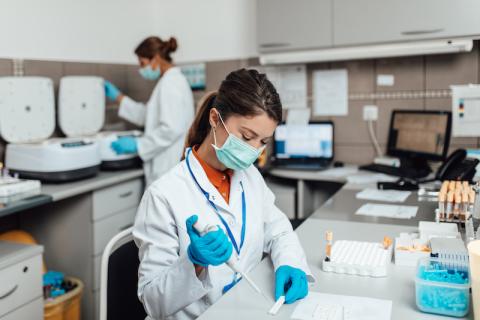
The Government has awarded £2.8 million to a new study that will focus on how to protect people with weakened immune systems against COVID-19.
COVID-19 has disproportionately affected people with health conditions that affect their immune system or make them less likely to respond well to vaccination. These people continue to be at higher risk of hospitalisation and death from COVID-19.
Evidence suggests that antibody levels following vaccination are a good indicator of how ill someone may become if they are infected with COVID-19. However, there is substantial variation between individuals – even among people with the same health condition – resulting in much uncertainty for both patients and doctors. Shielding is not sustainable in the long term and many people are desperate to know more about their own individual risk.
This new study, called Stratification of Clinically Vulnerable People for COVID-19 Risk Using Antibody Testing (STRAVINSKY), will involve 3,000 immunocompromised participants over two years. Its aim is to establish if antibody testing can identify which people remain at greatest risk of severe COVID-19 despite being vaccinated.
The study will be co-led by Dr Sean Lim at the University of Southampton and Professor Alex Richter at the University of Birmingham. They will each in turn co-lead work packages with Professor Ellie Barnes at the University of Oxford and Dr Michelle Willicombe at Imperial College London. Dr Beth Stuart will provide statistical support from Queen Mary University of London.
An additional 11 researchers from around the UK will help to recruit participants, and the PITCH study team will take on the role of recruiting the study's controls.
STRAVINSKY will see researchers follow 3,000 participants, monitoring them over two years to determine their antibody levels and other factors, and compare this data to matched controls. 400 of them will provide blood, nasal and saliva samples to enable a deeper analysis of their immunity to COVID-19. This analysis will be used to build a better understanding of who is clinically most vulnerable to COVID-19.
If it is found that antibody levels are not an adequate predictor of risk, these additional samples will help to identify other laboratory tests that may help determine who is most vulnerable. It is hoped that the study’s findings will equip healthcare professionals to make decisions about when to give certain treatments or booster vaccine doses to people who are immunosuppressed.
People with relevant lived experience will be involved in shaping and influencing the research, and will give their perspectives on priorities and how best to communicate the results to the wider public.
Professor Alex Richter, said:
Thousands of people with weakened immune systems still don’t know if they are at risk of becoming severely ill with COVID-19. This uncertainty has a devastating impact on their day-to-day lives and their overall wellbeing.
We hope that this new study will enable us to identify who is at greatest risk, and how they can best be protected. If we can target the right treatments to those that need them most, and help people to understand their own individual risk, we will be far better prepared to tackle future variants and the ongoing risk from COVID-19.
STRAVINSKY will be funded by the Department of Health and Social Care, via the National Institute for Health Research. Find out more here.
